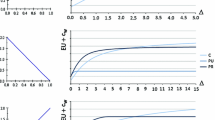Abstract
We study procurement procedures that simultaneously determine the specification and price of a good. Suppliers can offer and produce the good in either of two possible specifications, both of which are equally good for the buyer. Production costs are interdependent and unknown at the time of bidding. Each supplier receives two signals about production cost, one per specification. Our model is a special case of the interdependent value settings with multidimensional types in Jehiel and Moldovanu (Econometrica 69:1237–1259, 2001) where an efficient and incentive compatible mechanism exists. We characterize equilibrium bidding behavior if the winning supplier is selected purely on the basis of price, regardless of the specification offered. While there is a positive chance of obtaining an inefficient specification, this procurement mechanism involves lower information rents than efficient mechanisms, suggesting that there is a trade-off between minimizing expected expenditure for the good, and ensuring that the efficient specification is chosen.
Similar content being viewed by others
References
Apostol T.M.: Mathematical Analysis. Addison Wesley, Reading, MA, USA (1957)
Armstrong M.: Multiproduct nonlinear pricing. Econometrica 64, 51–75 (1996)
Armstrong M., Rochet J.C.: Multi-dimensional screening: a user’s guide. Eur Econ Rev 43, 959–979 (1999)
Asker J., Cantillon E.: Properties of scoring auctions. RAND J Econ 39, 69–85 (2008)
Asker J., Cantillon E.: Procurement when price and quality matter. RAND J Econ 41, 1–34 (2010)
Athey S.: Single crossing properties and the existence of pure strategy equilibria in games of incomplete information. Econometrica 69, 861–889 (2001)
Bergemann D., Pesendorfer M.: Information structures in optimal auctions. J Econ Theory 137, 580–609 (2007)
Branco F.: The design of multidimensional auctions. RAND J Econ 28, 63–81 (1997)
Che Y.K.: Design competition through multidimensional auctions. RAND J Econ 24, 668–680 (1993)
Che Y.K., Gale I.: Optimal design of research contests. Am Econ Rev 93, 646–671 (2003)
Cheng H.H., Tan G.: Asymmetric common-value auctions with applications to private-value auctions with resale. Econ Theory 45, 253–290 (2010)
Dasgupta P., Maskin E.: Efficient auctions. Q J Econ 115, 341–389 (2000)
Ewerhart C., Fieseler K.: Procurement auctions and unit-price contracts. RAND J Econ 34, 569–581 (2003)
Ivanov, M.: Information revelation in competitive markets. Econ Theory (2011). doi:10.1007/s00199-011-0629-3
Jehiel P., Moldovanu B.: Efficient design with interdependent valuations. Econometrica 69, 1237–1259 (2001)
Jehiel P., Moldovanu B., Stacchetti E.: Multidimensional mechanism design for auctions with externalities. J Econ Theory 85, 258–293 (1999)
Kaplan, T.R., Zamir, S.: Asymmetric first-price auctions with uniform distributions: analytic solutions to the general case. Econ Theory (2010). doi:10.1007/s00199-010-0563-9
Krishna V., Maenner E.: Convex potentials with an application to mechanism design. Econometrica 69, 1113–1119 (2001)
Krishna, V., Perry, M.: Efficient Mechanism Design, Pennsylvania State University Mimeo (2000)
Laffont J.J., Tirole J.: Auctioning incentive contracts. J Polit Econ 95, 921–937 (1987)
Lang S.: Calculus of Several Variables. Addison-Wesley, Reading, MA, USA (1973)
Lang S.: Calculus of Several Variables. Springer, New York, NY, USA (1987)
Lauermann, S., Wolinsky, A.: Search and Adverse Selection, University of Michigan Mimeo (2009)
Milgrom P.R.: Putting Auction Theory to Work. Cambridge University Press, Cambridge, MA, USA (2004)
Myerson R.B.: Optimal auction design. Math Oper Res 6, 58–73 (1981)
Rezende L.: Biased procurement auctions. Econ Theory 38, 169–185 (2009)
Rochet J.C.: A necessary and sufficient condition for rationalizability in a quasi-linear context. J Math Econ 16, 191–200 (1987)
Rochet J.C., Choné P.: Ironing, {sacute;weeping, and multidimensional screening. Econometrica 66, 783–826 (1998)
Schöttner A.: Fixed-prize tournaments versus first-price auctions in innovation contests. Econ Theory 35, 57–71 (2008)
Author information
Authors and Affiliations
Corresponding author
Additional information
I am indebted to Siddhartha Bandyopadhyay, Tilman Börgers, Mridu Prabal Goswami, Esther Hauk, Philipe Jehiel, Ian Jewitt, Thomas Kittsteiner, Andrea Prat, Colin Rowat, Rajiv Sarin and Gábor Virág. I would also like to thank an anonymous referee for many valuable suggestions. Finally, I am grateful for the hospitality of the Planning Unit at the Indian Statistical Institute (Delhi), and the Institute of Economic Theory and Statistics at Karlsruhe Institute of Technology, where much of this research was conducted.
Rights and permissions
About this article
Cite this article
Postl, P. Efficiency versus optimality in procurement. Econ Theory 53, 425–472 (2013). https://doi.org/10.1007/s00199-012-0699-x
Received:
Accepted:
Published:
Issue Date:
DOI: https://doi.org/10.1007/s00199-012-0699-x
Keywords
- Procurement
- Interdependent valuations
- Multidimensional information
- Efficient mechanisms
- Optimal mechanisms




